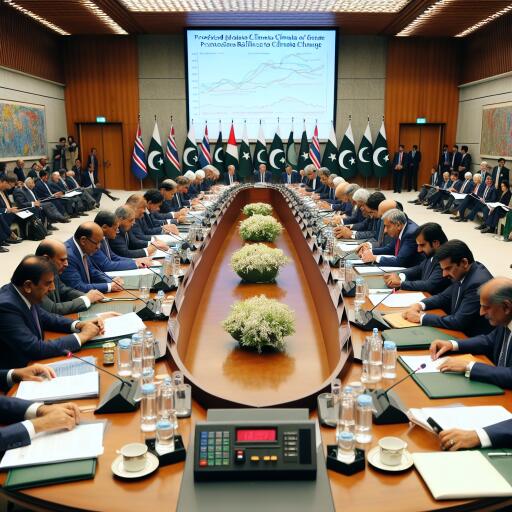
Pakistan, IMF Start Talks for Climate Resilience Funds
ISLAMABAD – In an effort to combat the increasing challenges posed by climate change, Pakistan and the International Monetary Fund (IMF) have commenced negotiations focused on the establishment of climate resilience funding. A four-member delegation from the IMF visited Islamabad to engage in these critical discussions on climate financing.
The delegation from the IMF is set to hold comprehensive talks with both federal and provincial authorities within Pakistan. The dialogue will delve into various aspects including green budgeting, tracking the impacts of climate change, effective reporting mechanisms, and the financial support required for related projects. The central aim of these discussions is to explore avenues that may allow Pakistan to access between $1 billion and $1.5 billion in climate resilience funds.
Negotiations kicked off on Monday, where both parties engaged in discussions about green budgeting, the tagging and tracking of climate-related spending, and the pertinent reporting processes. The talks stressed the importance of strategies designed to mitigate the impact of climate change and featured briefings on initiatives already implemented at both federal and provincial levels.
This focus on climate-related conversations is set against Islamabad’s plea for substantial funding, amounting to an additional $1 billion to $1.5 billion. This would build upon the existing $7 billion loan provided under the Extended Fund Facility (EFF), potentially increasing it to a total of $8 billion or $8.5 billion.
Pakistan’s vulnerability to climate change has been starkly highlighted in recent years, particularly in 2022, when the nation experienced catastrophic monsoon floods. These floods tragically resulted in the loss of over 1,700 lives and devastated large areas of agricultural land. An estimated 33 million people were affected, and the financial toll was enormous, with losses amounting to approximately $33 billion, as per government reports.
Further engagements are planned, with an additional IMF delegation scheduled for a visit next week. Pakistan’s Finance Minister Muhammad Aurangzeb has confirmed that the IMF will conduct its routine biannual review of the ongoing $7 billion bailout agreement, with this mission planned for early March. Through this review, Pakistan seeks to assure the IMF of its current economic health. If the technical discussions and the review mission proceed smoothly, Pakistan may secure $2 to $2.5 billion from the subsequent release of a $1 billion tranche and by extending the EFF through a Resilience and Sustainability Facility loan, which could range between $1 billion and $1.5 billion.
The ongoing dialogue reflects Pakistan’s dedication to addressing its climate vulnerabilities and adapting its economic framework to improve climate resilience. The potential funding from the IMF is seen as a critical step towards supporting projects that aim to counteract the impacts of climate change, thereby safeguarding the country’s future economic and environmental stability.





Leave a Reply